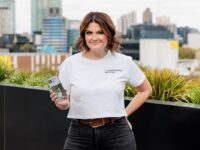This week we chat with Maree Beare, founder and CEO of Wanngi, a health management platform on which people can track and manage their symptoms, injuries, medications, allergies, immunisations and fitness progress.
ISB: Why did you give up the “safety net” of a salaried position to launch your own start-up?
MB: As a technologist I had a burning desire to use my skills to advocate for consumers in accessing their health information. When someone tells me “you can’t do it” (which happened a lot), it makes me want to do it even more. I spent a decade delivering innovation projects for large corporations and government agencies, and whilst they paid the bills, I constantly felt there was something lacking and that I was born to do more. When the idea of solving problems for social change came to me, I knew that was my calling and I went for it.
ISB: And what was the inspiration behind tackling the healthtech sector for this start-up venture?
MB: There is a lot of noise in the healthtech sector. And whilst the healthcare system tries to be patient-centric, there is little advocacy for consumers. I wanted to create one platform that made people with chronic health issues feel safe and heard. When it comes to a patient’s entire medical history, it can be stressful to remember everything, and for doctors to gather everything they need to know. I created Wanngi as a central place for people to track all their symptoms, health records, medication and treatment plans, so they can improve their diagnosis and have more effective conversations with their doctors.
ISB: What was the biggest challenge you faced in getting the enterprise off the ground?
MB: It’s disappointing that this is still something we have to address in 2021, but being an ambitious woman in a male-dominated tech industry has definitely been an ongoing challenge. As women, finding investment funding is quite daunting. Due to a lack of knowledge about the healthtech sector amongst Australian investors, scaling a company like Wanngi is hard locally. Adding the fact that I’m a female certainly doesn’t help the situation. Crunchbase data highlights this problem – female founders globally received only 2.3 per cent of the funding available in 2020, a decrease from 2.8 per cent in 2019. It’s frustrating that more often than not, when women entrepreneurs pitch to investors (mostly men) questions focus on the risks rather than the opportunities. It’s a shame because the healthtech sector is certainly a growth opportunity.
ISB: Bearing in mind that there are other health management apps out there, how do you ensure yours stands out from the crowd?
MB: We are in a world that is more connected than ever before, with healthcare that is not connected. Consumers want to cut through the noise for an authentic customer-first experience. Not only does Wanngi help people track their health in one place, it also allows them to export their entire medical history and share it with multiple doctors. As telehealth has skyrocketed, an app like Wanngi is so relevant. It also lets users record all immunisations – including COVID-19 vaccines – and store test results so medical professionals have access to them as and when required.
ISB:What is your vision for the development of the business in the next couple of years?
MB: We’re scaling our health management platforms to provide a direct-to-consumer approach to provide efficiencies in the $47 billion clinical trials market. Our mission is for Australia to become the hotspot for conducting clinical trials globally, which will be achieved by enabling a fast and efficient recruitment process for consumers to participate in clinical trials. Pharma companies globally have been unable to conduct many clinical trials in countries impacted by COVID. We are in a country where COVID is under control, and yet people with chronic illness who are seeking help for their illness are currently finding blocked pathways when searching for appropriate clinical trials.
ISB: And, finally, what is the number one piece of advice you’d give to women who aspire to launch their own start-up?
MB: Go for it. As women, only we know our struggle. We’ve all been there. Surprisingly, sometimes it’s women who dissuade other women from following their dreams, which is why it’s so important for us to be true to ourselves, stay determined and – last but definitely not the least – girls in this industry need to support each other.
















